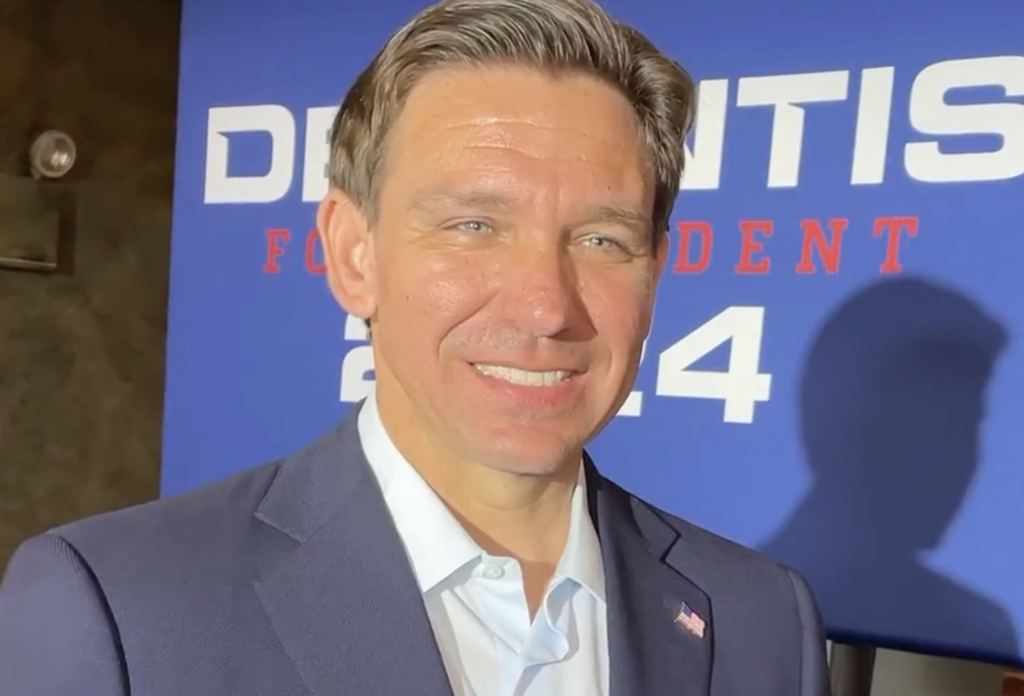Denial is oceanfront property in Iowa

Donald Trump is heading for his third straight dominant performance in the Republican primaries, but that’s not enough to convince Ross Douthat that the Republican base is fully Trumpian:
Donald Trump’s victory in the Iowa caucuses was resounding enough to make the race for the Republican nomination look essentially finished at the start. But it wasn’t resounding enough to remove the sense that it could have been otherwise, that yet again his opposition within the Republican Party made things ridiculously easy for his candidacy.
Trump is essentially running an incumbent’s campaign, presenting himself as the default leader of the party, declining to debate, rolling up endorsements. But his opposition combined, it appears, for reasonably close to 50 percent of the caucus vote. And for a normal incumbent, losing almost half the vote in an early state would be a sign of danger, weakness, disarray.
Eugene McCarthy’s 42 percent of the New Hampshire primary vote in 1968 forced Lyndon Johnson out of the race. Ted Kennedy’s 31 percent in Iowa and 37 percent in New Hampshire in 1980 betokened a long and bitter campaign for Jimmy Carter. Pat Buchanan’s 38 percent against George H.W. Bush in New Hampshire in 1992 was regarded as a political earthquake, even though Bush cruised thereafter.
This makes a certain amount of sense on a superficial level. But there are two obvious problems here. First, there’s a difference between an incumbent president and just a presumed frontrunner. And second, those parties were much more ideologically divided.
Which is way the idea that DeSantis and Haley could have made choices that materially affected the outcome of the race is highly unpersuasive:
So if the two anti-Trump candidates could converge that much on the issues despite their different constituencies, even in a debate they spent hammering at each other, it doesn’t seem that hard to imagine a single candidate running a unifying not-Trump-again campaign. It would be a little more populist than Haley’s candidacy has been, a little less ideological and Cruz-ish than DeSantis’s approach to date — but not so radically different from the race that we’ve watched both of them run.
If you wanted such a unifying not-Trump-again candidacy, you should blame DeSantis, first, for botching a chance to clear the field early and for failing to adapt thereafter. He lost his chance to be an actual front-runner when Trump began to be indicted. But a stronger start, a more effective operation and a sales pitch that emphasized his competence as much as his conservatism could have conceivably kept Haley in Tim Scott territory in the polling and brought many of her voters around to him in the end. Instead, as the conservative writer Peter Spiliakos argues, DeSantis’s persistent weakness encouraged the party’s moderates to treat their votes as expressive rather than strategic — backing Haley because it felt good, even though her path to victory was obscure.
But then you should also blame Team Haley — not her voters so much as the big donors who sustained her and right-of-center media figures who have spent the past few months boosting her — for going all in on a candidate who clearly, clearly has less of a chance of winning a head-to-head battle with Trump than even the disappointing version of DeSantis.
We will never get the chance to prove to an absolute certainty that Ron DeSantis would have been crushed in a two-person race against Trump, but am as certain as I can be about any conterfactual that this is true. Wishing for a Ron DeSantis who was an appealing enough candidate to keep Haley out of the race is just wishing that Ron DeSantis wasn’t Ron DeSantis.
Ultimately, DeSantis and Haley spent their type arguing over marginal differences because they can’t build candidacies around attacking Trump, for obvious reasons:
My problem with the "yes but 49% of Iowans wanted a Trump alternative" take is that the alternatives are aligned with Trump. Look at it this way:
MAGA (Trump): 51%
Reformed MAGA (DeSantis): 21%
Orthodox MAGA (Vivek): 8%
Republican Classic: 19%— David Weigel (@daveweigel) January 16, 2024

Trump is going to win easily because Republican primary voters strongly prefer Trump. Once we get out of a very unusual state where the most prominent Republican politician opposed Trump this is going to get really obvious. A better candidate than DeSantis may have made it look a little more respectable, but Trump’s opposition was always drawing dead.


